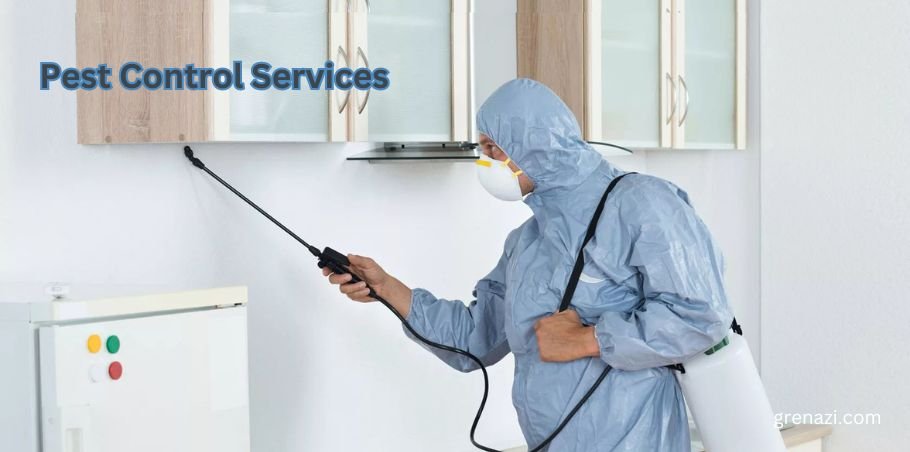Pest control isn’t just about keeping creepy crawlies out of sight; it’s an essential part of maintaining a safe and healthy home environment. From rodents scurrying in your attic to ants sneaking into your pantry, pests are not just a nuisance—they can pose serious health risks and cause extensive property damage if left unchecked.
In this guide, we’ll explore everything you need to know about pest control, from recognizing the signs of an infestation to exploring eco-friendly solutions that keep your home safe while protecting the environment.
Why Is Pest Control Important?
Why bother with pest control? The answer is simple: it protects both your health and your home. Pests can spread diseases, contaminate food, and cause structural damage to your property. Taking steps to prevent and manage pests not only saves you money but also shields you from potential health hazards. Pests come in all shapes and sizes, but some are more common than others. Let’s take a look at the usual suspects that invade our homes:
Insects
- Ants: Known for invading kitchens, these tiny insects are particularly attracted to sugary foods.
- Cockroaches: These nocturnal creatures are not only unsettling but can also trigger asthma and allergies.
- Termites: Silent destroyers that feed on wood, causing significant structural damage.
- Bed Bugs: Small, blood-sucking insects that can turn your home into a living nightmare.
Rodents
- Mice and Rats: They can chew through electrical wiring, creating fire hazards, and are known carriers of diseases.
Other Wildlife
- Squirrels and Raccoons: While these animals might seem harmless, they can cause severe damage to roofs and attics, while potentially carrying diseases like rabies.
How Pests Impact Your Health
Many pests pose serious health risks, making pest control essential to your well-being.
Diseases Spread by Pests
- Rodents: They are notorious for spreading diseases like Hantavirus and leptospirosis.
- Cockroaches: Known to spread harmful bacteria like Salmonella and E. coli.
- Ticks and Mosquitoes: Both are vectors for dangerous diseases like Lyme disease and malaria.
Allergic Reactions and Bites
Bites from pests such as bed bugs, fleas, or mosquitoes can lead to itchy, swollen skin reactions, and in some cases, cause allergic reactions that require medical attention.
The Financial Cost of Ignoring Pest Control
Ignoring pests in your home can result in hefty repair costs down the road. Termite infestations, for example, cause over $5 billion in damage annually in the U.S. alone. The longer an infestation is left untreated, the more expensive it becomes to fix.
Signs of Pest Infestation in Your Home
How do you know if you have a pest problem? Keep an eye out for these tell-tale signs.
Droppings: Small droppings are common with rodents and cockroaches.
Chewed Wires or Furniture: Rodents, especially, tend to gnaw on anything they can find.
Dead Bugs: Seeing dead insects in your home can be a sign of a growing infestation.
Strange Noises: Scratching, scurrying, or squeaking sounds in your walls or attic are often a sign of rodents.
Unusual Odors: Pests like cockroaches leave behind musty, unpleasant odors.
DIY Pest Control Methods
While some infestations require professional intervention, there are many DIY pest control methods you can try to keep pests at bay.
Seal Cracks and Holes: Pests can enter your home through the tiniest of openings.
Proper Food Storage: Keep food in airtight containers to avoid attracting pests.
Regular Cleaning: Clean your home regularly to remove crumbs and potential food sources for pests.
When to Call Professional Pest Control Services
Sometimes, DIY methods aren’t enough. If the infestation is severe, it’s time to call in the experts. If you’ve tried DIY methods without success, or if the pests are causing significant damage or health risks, a professional pest control service is your best bet. Look for licensed professionals with good reviews, and make sure they offer eco-friendly solutions if that’s important to you.
The Role of Integrated Pest Management (IPM)
IPM is a more sustainable approach to pest control that focuses on long-term prevention. By combining biological, cultural, physical, and chemical tools, it minimizes the use of harmful pesticides while effectively managing pest populations.
Eco-Friendly Pest Control Solutions
If you’re concerned about the environmental impact of traditional pest control methods, there are several eco-friendly options available. These include using biological controls like predatory insects, or opting for organic, non-toxic pesticides.
Pest Control for Specific Environments
Different environments attract different pests, and pest control strategies should be tailored to the specific area. Homes are often targeted by ants, cockroaches, and rodents, especially in kitchens and basements. Offices and warehouses are prone to infestations of rats, mice, and cockroaches due to the abundance of hiding spots and food sources. Gardens can attract pests like aphids, slugs, and squirrels. Regular lawn maintenance and planting pest-repellent flora can help keep these nuisances at bay.
The Future of Pest Control Technologies
With advancements in technology, pest control is becoming smarter and more effective. Innovations like automated pest traps, ultrasonic devices, and even pest control drones are shaping the future of the industry. Prevention is always better than cure. Some simple tips include:
Keep Your Home Clean: Regular cleaning reduces the chances of pests finding food.
Fix Leaks Promptly: Standing water attracts pests like mosquitoes and cockroaches.
Trim Trees and Bushes: Pests can use overgrown trees as pathways into your home.
Dealing with Seasonal Pests
Some pests are more active during certain seasons. For example, ants and termites thrive in the warmer months, while rodents seek warmth indoors during the winter. Be mindful of these seasonal shifts to stay ahead of potential infestations.
Conclusion
Pest control is vital for protecting your home and health. Whether you choose DIY methods or hire a professional, taking proactive steps to manage pests is a must. Regular maintenance, awareness, and a bit of effort can help keep your home pest-free all year round.








